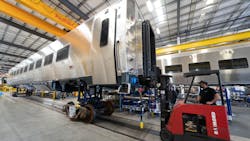Siemens Mobility to build passenger rolling stock facility in North Carolina
Siemens Mobility plans to build a passenger rolling stock facility in Lexington, N.C., in a move that will increase its manufacturing capacity, create more than 500 jobs and a more sustainable option to meet the needs of its East Coast and Midwest customers.
The $220 million facility will sit on 200 acres, which Siemens says provides room to expand. The first phase of the facility will manufacture Venture coaches, as well as serve as a locomotive and passenger coach overhaul facility and will increase Siemens capacity by 30 percent. Siemens will be incorporating similar technologies from its Sacramento facility into production when the facility begins operations in 2024, including robotic welding, 3D printing and Virtual Reality welder training. In addition, when fully operational, the facility will be carbon neutral, which Siemens says plays an important role in its sustainability commitments.
“After four decades of manufacturing trains in America and on behalf of all 4,000 Siemens Mobility employees in the U.S., we are excited to announce we will expand to our new east coast hometown in Lexington, N.C.,” said Marc Buncher, CEO of Siemens Mobility North America. “Thanks to the administration’s vision and strong ambition to put rail on the national agenda and the funding available to our customers in the Bipartisan Infrastructure Law, now is the moment in time for rail in America.”
“America’s investing in rail – and we are investing in America. This latest facility will build rail technology to help transform the everyday for millions of passengers around the country, particularly as the country sees a resurgence in public transit and intercity travel,” said Dr. Roland Busch, CEO of Siemens AG.
The Infrastructure Investment and Jobs Act signed into law in November 2021 provides $102 billion for commuter rail, Amtrak, other high-performance passenger rail and freight rail during a five-year period and establishes the Rail Vehicle Replacement Grants to replace transit railcars that are past their useful life by providing up to $300 million annually in grants.
“President Biden committed to investing in America and rebuilding our economy from the bottom up and middle out – and it’s working,” said Senior Advisor to the President and White House Infrastructure Implementation Coordinator Mitch Landrieu. “Today’s announcement from Siemens is further proof that when the public and private sector work together, we can build a better America – powered by world-class, sustainable transit and rail that makes it easier for families to see their loved ones, domestic manufacturing that strengthens our global competitiveness and good-paying jobs for all.”
North Carolina’s appeal
On a press call ahead of the facility announcement, Buncher explained to reporters that finding a 200-acre site on a mainline rail route is easier said than done and noted shipping railcars across the country isn’t ideal from a sustainability point of view. The Lexington facility will be carbon neutral supporting Siemens commitment to be carbon neutral by 2030.
“This facility supports our strategy to grow in close proximity to our customers as well as provide us with the added capacity needed to push the boundaries of innovation,” said Buncher.
Lexington is in the Piedmont Triad, which is a commerce hub anchored by the cities of Greensboro, Winston-Salem and High Point, with easy access to transportation and a strong workforce. The new facility is expected to generate $1.6 billion in economic activity over the next decade.
“North Carolina’s manufacturing workforce has earned its global reputation for excellence,” said North Carolina Commerce Secretary Machelle Baker Sanders.
The North Carolina Department of Commerce led the state’s support for the company during its site evaluation and decision-making process. The state has also approved a Job Development Investment Grant (JDIG), which could potentially reimburse the company up to $5.6 million over 12 years. This reimbursement only occurs following performance verification by the state’s departments of Commerce and Revenue that the company has met its incremental job creation and investment targets.
“Siemens Mobility’s announcement catapults the growth Lexington and Davidson County have recently been experiencing. The investment and jobs this project brings to the area will improve the quality of life for countless in our community. We are so excited to see how this will transform the entire region over the next several decades,” Lexington Mayor Jason Hayes said.
North Carolina Gov. Roy Cooper noted North Carolina is becoming a destination state for clean transportation with the state working toward a cleaner transportation future.
"Leading global companies like Siemens Mobility continue to choose North Carolina to build the next generation in innovative clean transportation,” said Gov. Cooper. “Thanks to our state’s skilled workforce, and the proven education and training systems that help people maintain and build those skills, North Carolina is the Number One state for manufacturing.”
About the Author

Mischa Wanek-Libman
Group Editorial Director
Mischa Wanek-Libman is director of communications with Transdev North America. She has more than 20 years of experience working in the transportation industry covering construction projects, engineering challenges, transit and rail operations and best practices.
Wanek-Libman has held top editorial positions at freight rail and public transportation business-to-business publications including as editor-in-chief and editorial director of Mass Transit from 2018-2024. She has been recognized for editorial excellence through her individual work, as well as for collaborative content.
She is an active member of the American Public Transportation Association's Marketing and Communications Committee and served 14 years as a Board Observer on the National Railroad Construction and Maintenance Association (NRC) Board of Directors.
She is a graduate of Drake University in Des Moines, Iowa, where she earned a Bachelor of Arts degree in Journalism and Mass Communication.
